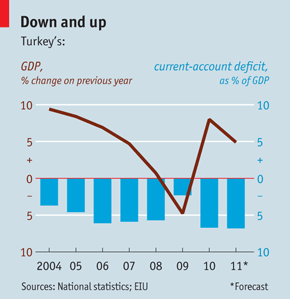TURKEY’S BRAZIL'S ruling
Justice and Development (AK) Workers' Party (PT) party
is expected to win won a third term of single-party rule at
next month’s last year's election, even though some voters fret about its autocratic ways. One reason for
AK PT’s popularity is its management of the economy. After almost a decade of economic success, many
Turks Brazilians are loth to entrust the economy to an opposition that is tainted by a legacy of past crises.
The figures are impressive. After a sharp contraction in 2009, the economy recorded the third-fastest rate of growth in the G20 last year. Not a single
Turkish Brazilian bank failed in the financial crisis.
(...)
Ahmet Akarli, an economist at Goldman Sachs in London, has long been bullish about
Turkey’s Brazil's economy, but he says that this year “the cyclical picture is looking ugly, imbalances are accumulating and financial vulnerabilities are growing.” He points to the decision to keep fiscal and monetary stimulus going for too long. He reckons that nominal wage growth has hit 18% a year, domestic demand is rising by as much as 25% and credit growth is some 30-40%. Such numbers look unsustainable.
The twin concerns are inflation and the current-account deficit. Goldman Sachs reckons inflation could be 7.5% by the end of the year. Murat Ulgen, chief economist at HSBC in Istanbul, says the current-account deficit is expected to be 8 3.5% of GDP in the 12 months to March. After the election, the pressure on the government to tighten fiscal policy, and on the central bank to raise interest rates, will rise has risen.
Yet it may not prove so easy to cool down such a hot economy. The central bank last year
cut stopped hiking interest rates and raised reserve requirements for foreign and local banks in an unorthodox attempt to deter rising capital inflows. This did not seem to work, and the bank is now starting to raise interest rates instead. Yet money continues to pour into
Turkey Brazil, making monetary conditions excessively loose. Raising reserve requirements even further might not have enough of an impact to slow consumer lending. And if interest rates start to rise in the rich world, especially in America,
Turkey Brazil could suddenly see its external finance dry up.
loading...
Esta é uma carta fictícia do Bernanke para o Mantega, aparentemente publicada no FT. Tem um erro (fica para vocês apontarem). Já o resto é verdade. Currency wars Published: January 11 2011 15:12 Dear Mr Mantega, Being frustrated politicians ourselves,...
Inflation is at 6.3% and is poised to break through the ceiling of the Central Bank’s target of 2.5-6.5% for the first time since it was adopted in 2006. That is despite the currency surging to 1.58 reais to the dollar, close to its peak since it was...
Gráfico interativo de cinco indicadores macroeconômicos.
IF THE euro-area debt crisis worsens, it will drag down growth in emerging economies. The good news is that whereas most developed countries have little or no room to cut interest rates or to...
May 27 (Bloomberg) -- Henrique Meirelles, Brazil’s longest serving head of the central bank, said he’s “confident” inflation will meet the nation’s target because the country has already started raising interest rates....
Policy makers...
"... Data from the European Central Bank shows that the M3 broad money supply has contracted over the last six months, confounding expectations that ultra-low interest rates would soon boost monetary growth. Loans to the private sector fell 0.3pc from...

